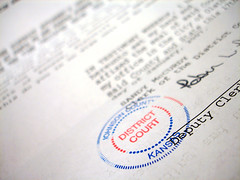Why can the TSA subpoena bloggers to get at their sources?
By Kristopher A. Nelson
in
January 2010
600 words / 3 min.
Tweet
Share
The TSA issued a directive aimed at instituting new security measures. After two bloggers published it, the TSA issued subpoenas that sought to compel them to reveal their sources. Why did the TSA think they could do this, and did they have the power to enforce their request?
Please note that this post is from 2010. Evaluate with care and in light of later events.
 The Transportation Security Administration (TSA) issued a directive aimed at instituting new, possibly temporary, security measures after the recent attempt against a flight into Detroit. The TSA sent the document to airlines and airports around the world and was not classified. Nevertheless, after two bloggers published it on Dec. 30, the TSA sought details from them as to how they obtained the document, maintaining that “it was not for public disclosure.”
The Transportation Security Administration (TSA) issued a directive aimed at instituting new, possibly temporary, security measures after the recent attempt against a flight into Detroit. The TSA sent the document to airlines and airports around the world and was not classified. Nevertheless, after two bloggers published it on Dec. 30, the TSA sought details from them as to how they obtained the document, maintaining that “it was not for public disclosure.”
As part of this, the TSA issued subpoenas duces tecum (legal orders requiring that documents or information be produced) that sought to compel the two bloggers to reveal their sources. After a public outcry, the TSA “canceled the legal action and apologized for the strong-arm tactics agents used.”
Normally, subpoenas are issued by a court clerk or, more commonly, by attorneys working on a case who issue such subpoenas under the authority of the supervising court. The goal is to compel witnesses to either come to court or produce documents or information to be used in court. Enforcement is not automatic, but is instead sought through the court supervising the case, which has the power to punish someone who refuses to obey a subpoena without sufficient cause (as determined by the court).
The subpoenas (or “subpenas”) in this situation, however, were not issued or supervised directly by a court, according to the text of the document provided by Chris Elliot, one of the targeted bloggers. Instead, they were issued by the TSA under authority granted to it by Congress in 49 U.S.C. 46104. (This authority is similar to that granted to District Attorneys for conducting investigations.) It grants the authority to the TSA to:
subpena witnesses and records related to a matter involved in the hearing or investigation from any place in the United States to the designated place of the hearing or investigation
The law does not grant to the TSA the authority to enforce subpoenas directly. Instead, the TSA must “petition a court of the United States to enforce the subpena.” The court then conducts a hearing, and may impose penalties (including imprisonment).
One can object to subpoenas on a variety of grounds. (Note that one of those grounds is not the Fourth Amendment, since this is not considered a “search” or a “seizure.”) The order may be overly broad or burdensome (although the court may simple require you be reimbursed for your expenses in that case) or may request confidential information protected by privilege (attorney-client privilege, or doctor-patient, for example). Some states protect a journalist’s right to protect an anonymous source — but there is no equivalent federal “shield law.”
This is why the TSA felt it could indeed demand information from the bloggers, and why it is very possible they could have succeeded in penalizing the two bloggers in court if they did not turn over the information they had. (Of course, there may have been other arguments that a lawyer experienced in this area could have wielded — so if you are subpoenaed and would prefer not to comply, consult an attorney.)
For more on subpoenas generally, and how to respond to them, see: Responding to Subpoenas by the Citizen Media Law Project. The Project also has a good guide to protecting sources and source material more generally. I wrote about this previously in Journalist Shield Laws and Bloggers.